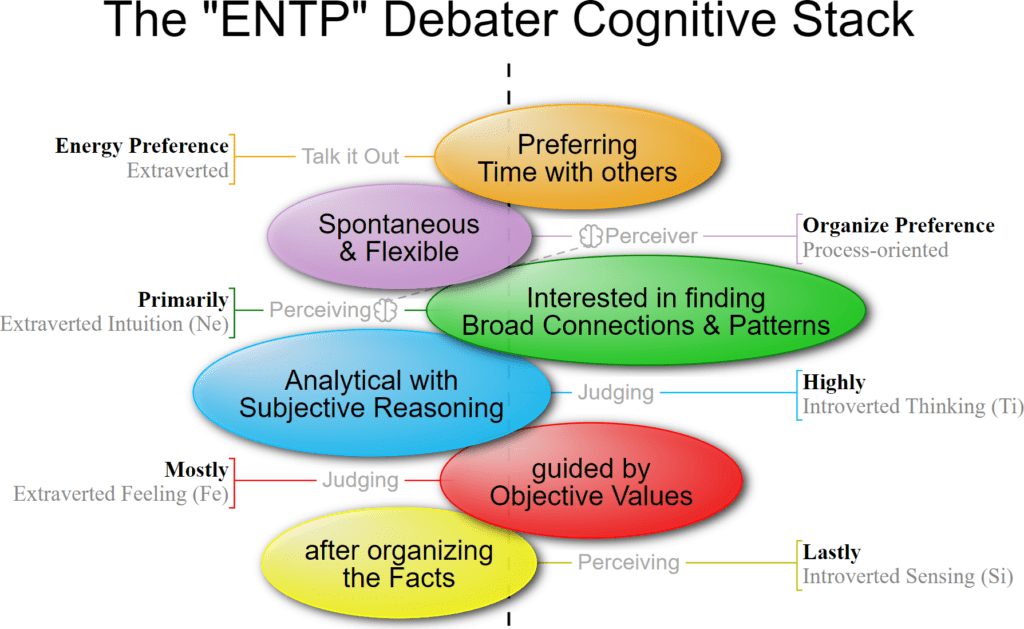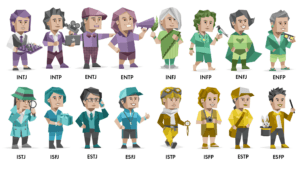The ENTP Debater Personality Type

People with ENTP Personality Type are often described as idea-oriented, innovative, clever, and expressive.
With Extraverted Intuition as their dominant and top extraverted function, Debaters are Perceivers who think about broad connections and patterns.
They are less interested in the here and now, preferring to generate new ideas and theories.
Because of this, they sometimes generate one idea after another without making plans or taking action to bring their creative notions to fruition.
With Introverted Thinking as their principal Judging function, Debaters use personal subjective reasons when making decisions.

Debaters are guided by objective values and their extraverted feelings, and they like to organize the facts with their lowest function, introverted sensing.
Debaters are extraverted, preferring time with others to discuss things. They are process-oriented, spontaneous, and flexible.
Debaters are “Abstract Perceivers” with Introverted Thinking and Extraverted Intuition. When feeling threatened, they will talk in dry, emotionally disconnected theoretical language. They may also behave with the Computer Satir Communication Style.
ENTP Personality Type cross-reference
- Temperament Type – Choleric
- Animal Type – Lion
- DISC Type – Dominant
- Socio-Communicative Type – Driver
- True Colors – Green
- Color Code – Red
- Personality Compass – North
- Occupational Type – Enterprising
- Learning Type – Activist
- Leadership Type – Dominator
Enneagram Types
The Enneagram is a Personality Typing System comprising nine different types.

Dominant Function – Extraverted Intuition
- They tend to take in information quickly and are very open-minded.
- Once they have gathered this information, they spend time making connections between various complex and interwoven relationships.
- They are good at spotting connections others might overlook and tend to focus on possibilities.
- They have entrepreneurial minds and always come up with new and exciting ideas.
Auxiliary Function – Introverted Thinking
- This cognitive function is expressed in the ENTP’s thinking process.
- People with this personality type are more focused on taking in information about the world around them.
- They tend to be very logical when they use this information to reach conclusions.
- They are logical and objective.
- They focus more on rational evidence than personal, emotional information when making decisions.
- This function helps them understand all the information that comes in through the extraverted intuition function.
- This involves imposing logic and order to help make sense of many disparate ideas and pieces of information.
- They don’t want to understand that something works – they want to understand the why and how behind how things function.
Tertiary Function – Extraverted Feeling
- As a tertiary function, this aspect of personality may not be as well-developed or prominent.
- When developed, they can be social charmers who can get along well with others.
- When this aspect of personality is weaker, they may be insensitive to others and even be seen as aloof or unkind.
Inferior Function – Introverted Sensing
- The introverted sensing function is centered on understanding the past and often applying it to current experiences and future concerns.
- This is often a point of weakness for ENTP personalities.
- They are often focused more on possibilities.
- As a result, they may fail to consider how past precedents may help predict outcomes.
- They also tend to overlook many more mundane details of daily life, especially if they are deeply involved in a project or plan.
ENTP Traits
ENTPs are curious, innovative, and outgoing. They enjoy interacting with a wide variety of people, mainly if they can engage in a conversation or debate about something they are interested in.
They are fiercely loyal in personal relationships and will go to any lengths for those they care for.
Their primary function is Extraverted Intuition, which allows them to see the different possibilities of a scenario or when making decisions.
ENTPs constantly absorb new information and ideas, always seeking to understand the world around them, and can quickly arrive at conclusions.
They like to try new ideas and, once proven, move on to their next challenge rather than follow through on their current project.
ENTPs focus more on the future than immediate details, do not follow procedures, and prefer looking for new methods to improve efficiency.
ENTPs are great conversationalists who love engaging others in debates. They often argue to learn from the argument. They are usually willing to play the devil’s advocate and will change positions on a subject to learn as much as possible.
Strengths
- Innovative
- Creative
- Great conversationalist
- Enjoys debating
- Values knowledge
Weaknesses
- Can be argumentative
- Dislikes routines and schedules
- Does not like to be controlled
- Unfocused
- Insensitive
ENTP Relationships
Friendships
- They are great at getting along with people regardless of their personality type.
- While they are usually laid-back, they can be pretty competitive.
- If you are friends with an ENTP, be careful not to try to outdo each other.
- Be aware of their love for debates and not escalate good-natured discussions into combative arguments.
Personal Relationships
- Since they are identified as extraverts, it may be no surprise that ENTPs have excellent people skills.
- They are skilled communicators and enjoy interacting with a wide circle of family, friends, and acquaintances.
- In conversations, other people often find them quick-witted.
- They will often engage in debates simply because they enjoy having a good battle of the wits.
- Sometimes, their love of arguments leads them to play the devil’s advocate, which can sometimes lead to conflicts with others who feel like they are intentionally combative and antagonistic.
Partner Relationships
- In intimate relationships, ENTPs can be passionate and exciting.
- They are warm and loving. Good at understanding their partner’s needs.
- You may find they struggle to follow through on their promises, which can sometimes be a source of frustration.
- Be aware of your ENTP partner’s need for spontaneity.
- You can help balance your partner’s impulsiveness by assisting them in working toward their goals enthusiastically and practically.
Parenting
- ENTPs have a fun-loving nature and are excited to share their sense of wonder with their children.
- Parents with this personality type are supportive.
- Still, they try to turn every situation into a learning opportunity.
- Parents of ENTP children should know that their children may sometimes seem argumentative.
- It stems from their natural love for discussion and debate.
- They may also seem inconsistent at times, being warm and affectionate in one moment and then withdrawing in the next as they become wrapped up in new ideas.
- Parents should encourage their children to focus on goals and finish the things they start.
ENTP Careers
- Routines and boredom are not suitable for the ENTP personality.
- They are non-conformists.
- They do best in jobs where they can find excitement and express their creative freedom.
- ENTPs can succeed in many careers if they do not feel overwhelmed or bored.
- As debaters with excellent communication skills, I believe that careers in law can offer the challenge and diversity that ENTPs crave.
- Jobs in the business world that combine the ENTP’s rationality, creativity, and natural leadership abilities can also be advantageous.


